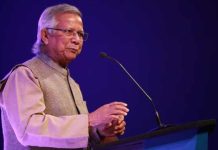Dr M Ali Hamza
In 1933 when Democrat Franklin Delano Roosevelt took office as 32nd US president, America was in great financial depressions and had the bleakest days. He had no other priority but to swiftly stabilize the economy and provide jobs and relief to those who were suffering. Before completing the first 100 days Roosevelt came up with an economic plan known as ‘New Deal’. Down the line in next eight years ‘New Deal’ fundamentally and permanently changed the US federal government by expanding its size and scope; especially its role in the economy. Almost after 9 decades another Democrat Joe Biden took office as 46th US president and having the toughest challenges before him. COVID-19 caused the death of 400,000 Americans, a new and more contagious strain of the coronavirus is rapidly gaining a grip in the United States, more than 10 million jobs erased in only 2020, stock market returns reduced 8% and federal budget deficit increased in recent years, job creation and real wage growth reduced, racial injustice is on its peak in American society, and electorate is bitterly divided. These are some examples of US internal concerns that indicate an existential crisis US is going through. Rapid bombardment of executive orders show that Joe Biden does not underscore the magnitude of the challenge facing his administration on one hand and such speedy orders help in specifying his emphasis and focus area for the first 100 days.
One of a series internal challenge is expressed through Biden’s call for national unity, even devoting much of his inaugural address not to the policies and programs to come, but to the “uncivil war” that Americans must put behind them to tackle their myriad national challenges. The current US political scenario recalls the time when Gerald Ford became president in 1974 in the wake of Richard Nixon’s resignation due to the Watergate scandal and announced “Our long national nightmare is over.” It appears that President Joe Biden is ‘déjà vu’ all over again. Choosing the theme of unity expresses the grave concern of polarization in US society: the racial inequality, black people matter, white supremacy, 74 million people voted for Donald Trump explains the dire need for unity among Yankees. The days of dandling seem disappeared. Looking into calling shots, out of thirty, 14 executive orders in first three days of Biden, are just about COVID-19 including hundred days masking challenge, reversing the Trump’s policy to withdraw from WHO etc. other executive orders mainly relate to economic recovery. It shows that Biden priority is to get country out of the emergency his predecessor left; primarily emergency in the internal matters of US. The question is whether Biden administration will be able pass 1.9 trillion US$ relief package from senate, will they get 100 million Americans vaccinated in first quarter, and could this new administration bring up any ‘New Deal’ for the US citizens in first 100 days completing on 30th April 2020. Beside internal issues some non-negligible world matters require Biden’s attention.
World outside the US poses its own challenges and call for policy decisions by Biden administration. Lately the statement by Israel’s top military personnel Lieutenant General Aviv Kohavi pulls in the attention of the world. General Kohavi asked US newly elected government not to return to the Iran nuclear deal; knows as JCPOA (Joint Comprehensive Plan of Action). He expressively and aggressively stated that a return to the 2015 nuclear agreement, or even if it is a similar accord with several improvements, is bad and wrong from an operational and strategic point of view. JCPOA is a detailed, 159-page agreement with five annexes reached by Iran and six participant countries; China, France, Germany, Russia, United Kingdom, and United States, on July 14, 2015. The nuclear deal was endorsed by UN Security Council Resolution 2231, adopted on July 20, 2015. Despite Iran’s verified compliance with the deal, the Trump’s administration unilaterally withdrew from the JCPOA on May 8, 2018, and subsequently re-imposed all U.S. sanctions on Iran lifted by the accord. In response Iran began to incrementally violate the agreement in May 2019.Otehr participants dismissed US call to re-impose sanction. It is important to understand that US joined JCPOA in Obama’s time when Biden was a vice President, so there is high probability that another executive order of Biden might reverse the withdrawal decision of US from the Iran’s nuclear deal agreement that was put in place by former President Barack Obama in 2015; an administration where Mr. Biden served as Vice President. Kohavi’s statement that Israel’s army is preparing a number of operational plans in addition to the existing ones, sparkling fear of world war 3 and indicating Israel’s anti Iran strategic plan on one hand, and sending a message to Biden administration to avoid such policy reversal on the other hand. It is convenient for Biden to raise concerns about withdrawing troops from Afghanistan and stretch the Peace Process but it does not seem easy to join back JCPOA, and that will reveal ‘who runs America’.

















